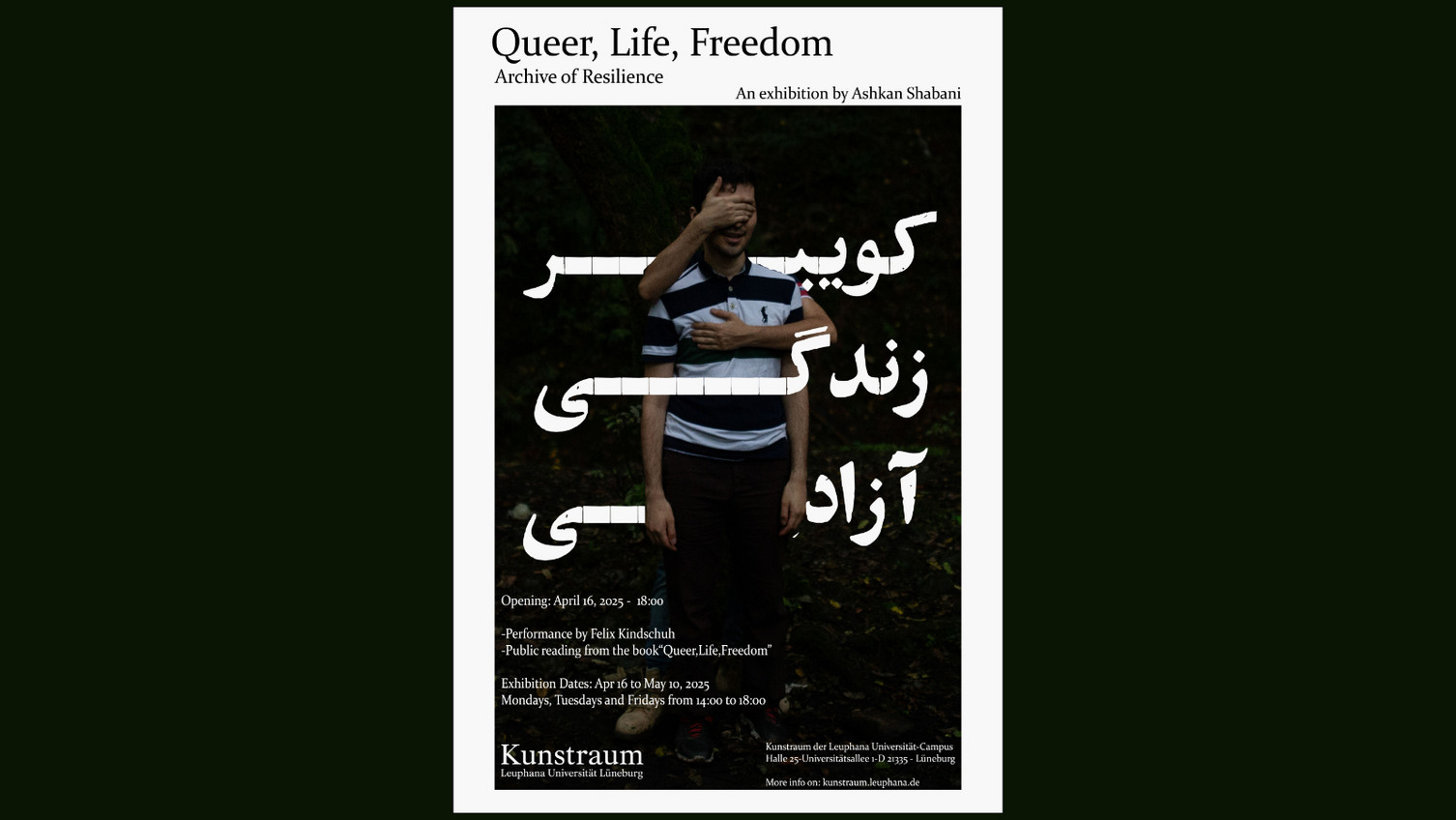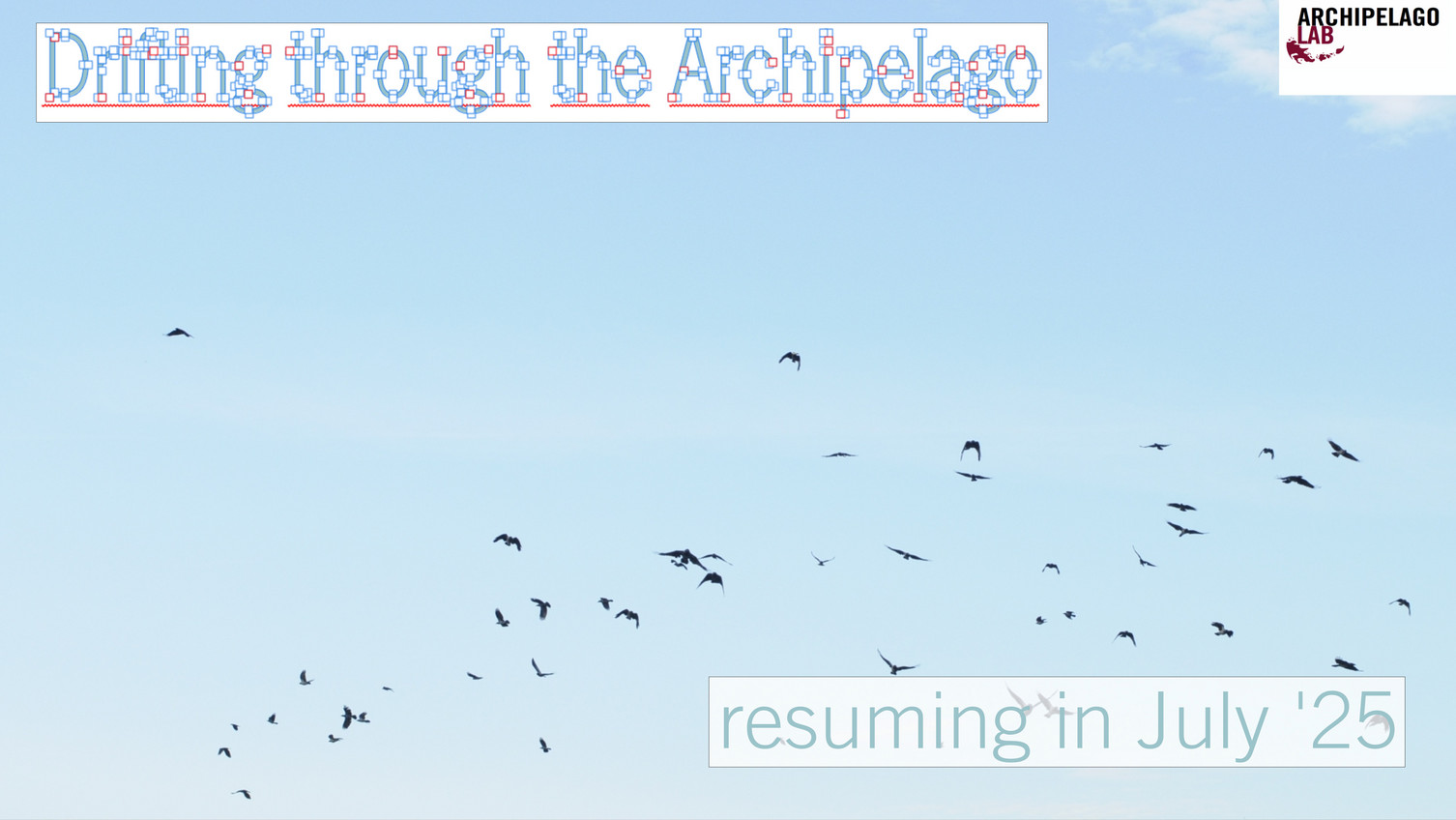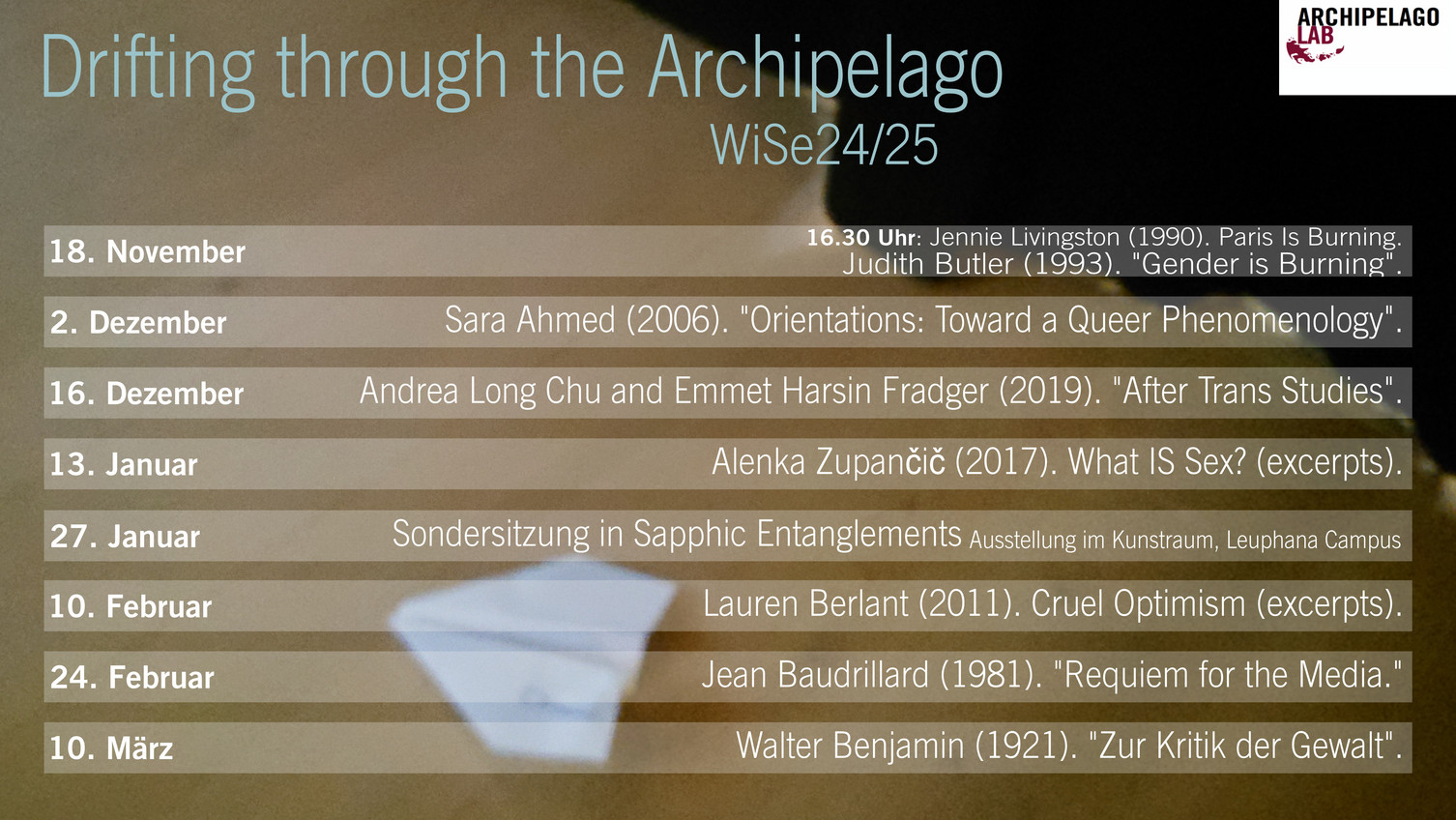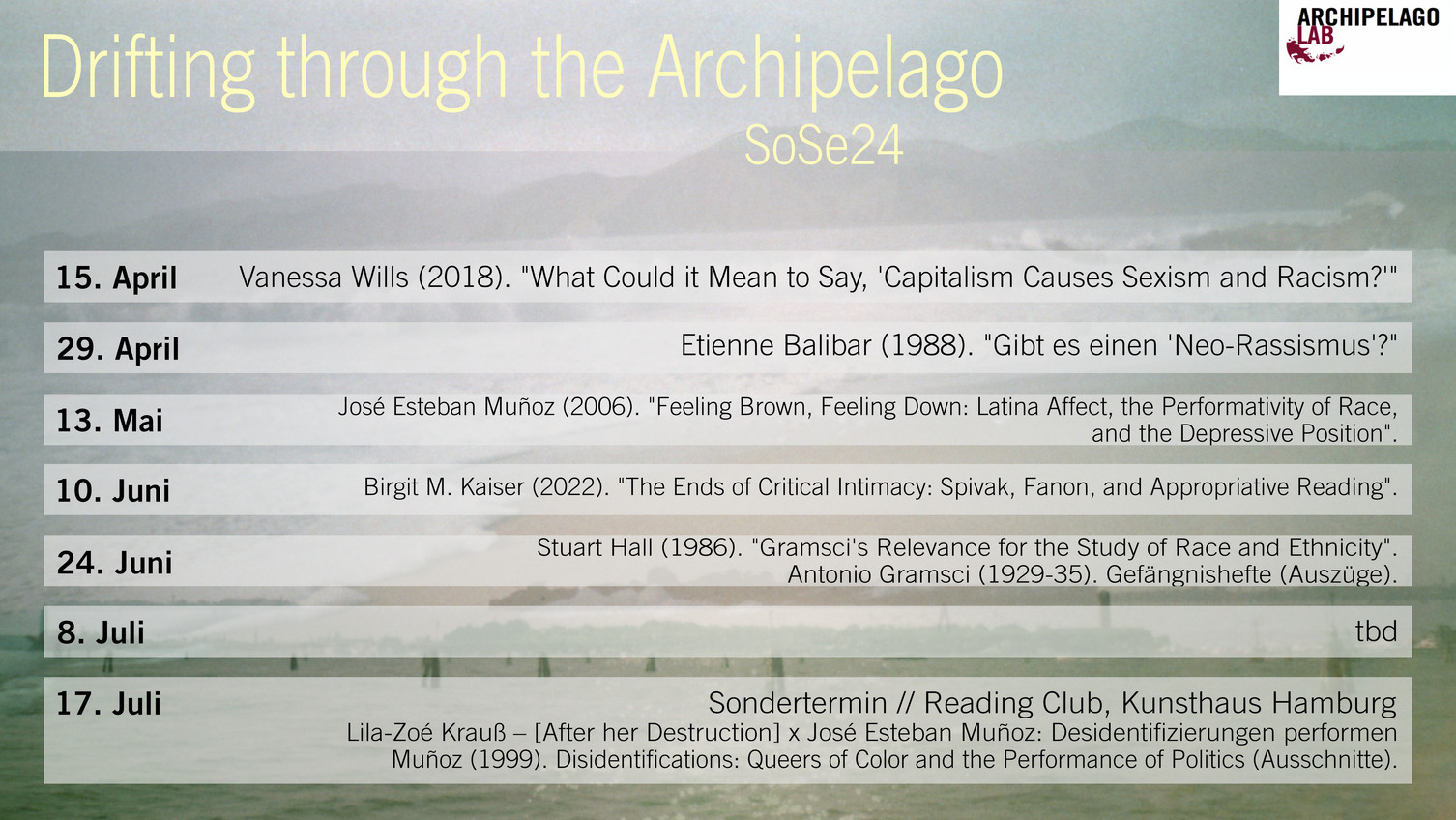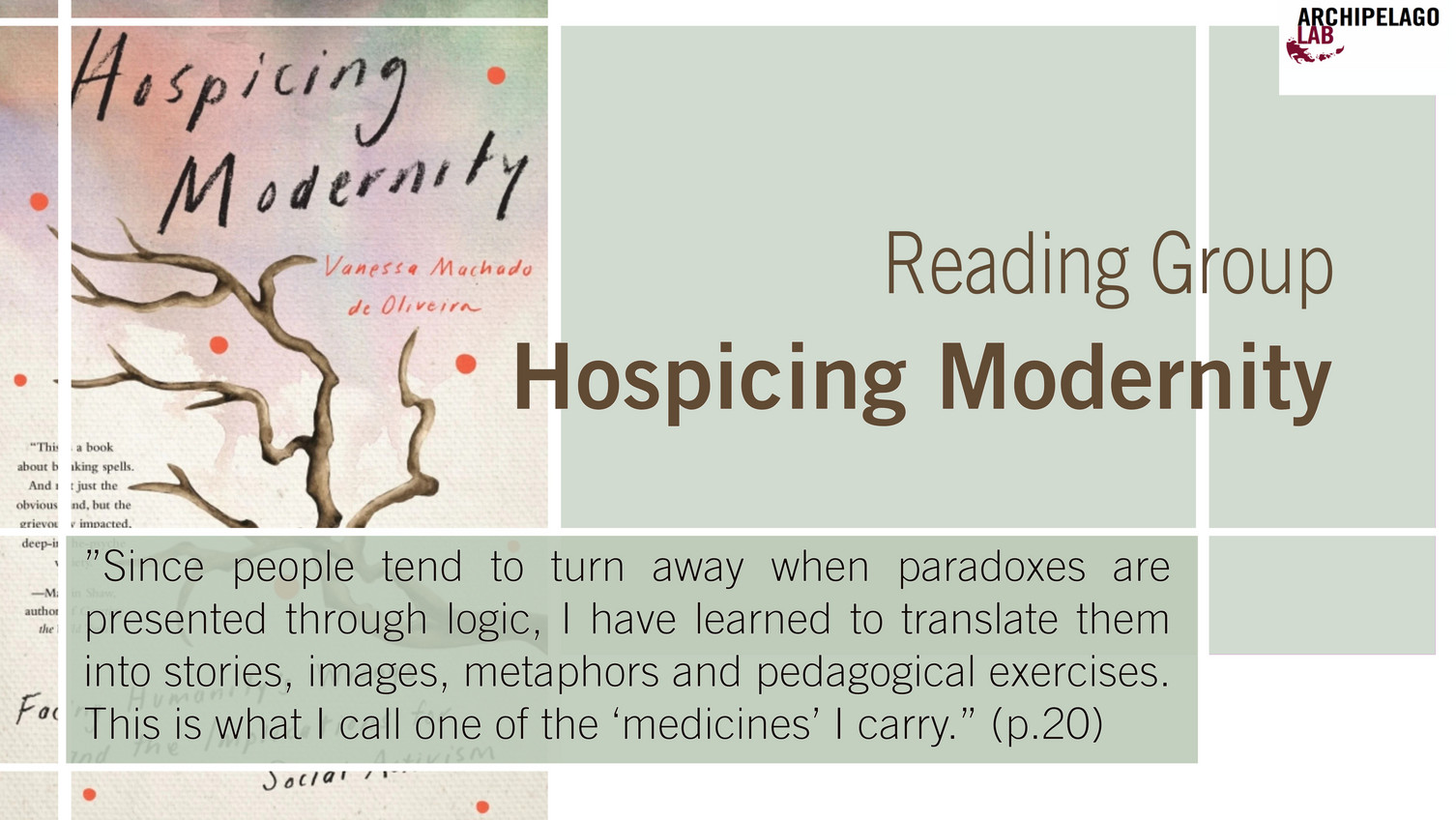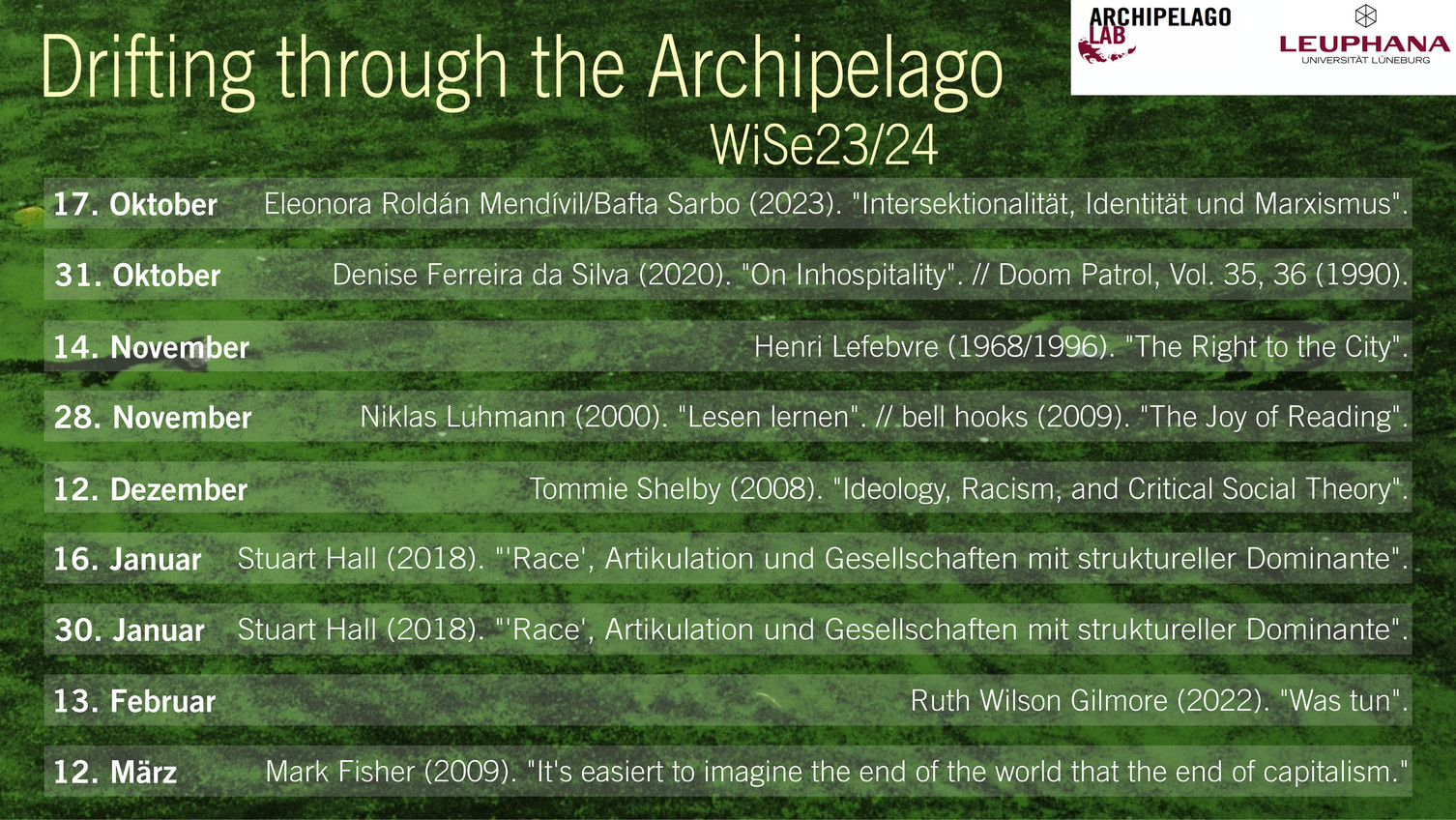May 6 2025
6 pm
Kunstraum, Leuphana Universität
Reading club I: “Territory and Borders, Racial Capitalism and Sovereignty in Crisis”, by Gargi Bhattacharyya.
May 9 2025
2 pm
Kunstraum, Leuphana Universität
Reading Club II: “Photographic Evangels”, by Susan Sontag.
The reading club is open to anyone and part of the program accompanying the exhibition “Queer, Life, Freedom” at Kunstraum.
In this reading group we read texts that are currently moving the people who are active in and around the Lab, that we want to explore together, and that thus become part of the Archipelago.
The Reading group is organized collectively by Ilkay Aydemir, Giorgi Chubinidze, Linn Felgendreher, Leon Follert, Frieder Janz, Julia Jeske, Marie Lynn Jessen und Katharina Tchelidze.
Material:
For text and access information, feel free to send a quick email to archipelagolab@leuphana.de.
every second monday
6 pm
The group will be held mainly in German, in English per request.
online
In this reading group we read texts that are currently moving the people who are active in and around the Lab, that we want to explore together, and that thus become part of the Archipelago.
The Reading group is organized collectively by Ilkay Aydemir, Linn Felgendreher, Leon Follert, Frieder Janz, Julia Jeske, Marie Lynn Jessen und Katharina Tchelidze.
Material:
For text and access information, feel free to send a quick email to archipelagolab@leuphana.de.
*This semester, the reading club has a special date at the exhibition Sapphic Entanglements at Kunstraum.
SoSe24 - Drifting through the Archipelago
every second monday
8 pm
The group will be held mainly in German, in English per request.
online
In this reading group we read texts that are currently moving the people who are active in and around the Lab, that we want to explore together, and that thus become part of the Archipelago.
The Reading group is organized collectively by Ilkay Aydemir, Linn Felgendreher, Leon Follert, Frieder Janz, Julia Jeske, Marie Lynn Jessen und Katharina Tchelidze.
Material:
For text and access information, feel free to send a quick email to .
*This semester, the reading club has a special date at the Kunsthaus Hamburg. In their Reading Club we will visit the exhibition Lila-Zoé Krauß - [After her Destruction] and then read excerpts from José Esteban Muñoz's Disidentifications: Queers of Colour and the Performance of Politics (1999) in a public gathering.
SoSe24 - "Hospicing Modernity - Facing Humanity's Wrongs and the Implications for Social Activism”
Tuesdays
2 - 4pm
ArchipelagoLab (C5.225)
contact: Smilla Grubert
The exchange will take place in German and English.
”Since people tend to turn away when paradoxes are presented through logic, I have learned to translate them into stories, images, metaphors and pedagogical exercises. This is what I call one of the ‘medicines’ I carry.” (p.20)
With these words, Vanessa Oliveira de Machado, who is a specialist in articulating paradoxes at the interface of colonial encounters, describes the nature of her work. In the trans-disciplinary ‘GESTURING TOWARDS DECOLONIAL FUTURES’ collective, she has conducted research with indigenous knowledge keepers, artists, researchers, students and educators and recorded her findings and results in an unsettling gift: her book “Hospicing Modernity - Facing Humanity's Wrongs and the Implications for Social Activism”.
It is precisely this book that the reading circle is dedicated to, which can also transform into a space for collective research, grieving and practice. For right at the beginning, the author advocates that, in view of inhabiting a world that is characterised by multiple crises, it is important to develop the ability of "holding spaces where heavy things can be held and difficult movements can happen without relationships falling apart".
About the book:
Based on the observation that the idealisation of Western forms of good life (notions of progress, development) no longer offer the security and well-being promised that modernity conditions us to want, the author concludes that we are in the midst of a dying process of modernity. The closely interwoven symptoms manifesting the devastating state of planet Earth are increasing in intensity at an alarming rate. We live, grow up and educate ourselves in an accelerated world of unpredictability in which not only technological developments change in extraordinary dimensions, change itself is constantly changing!
So we have to ask ourselves with which theory of change we encounter the systemic crisis?
Usual theories of change assume that if there is a problem with the system out there, we the ‘virtuous, moral or enlightened’, need to solve it by patching it up or by offering a better alternative for replacement. Vanessa Oliveira de Machado's considerations are based on a different theory of change which suggests that we must examine how violence and unsustainability are conditions necessary for the system (that is ‘not working’) to exist, how we are part of this system and complicit in the harm.
Alongside a sophisticated de-colonial analysis of modernity, ‘Hospicing Modernity’ explores our entanglement with the shit that we need to compost together (Haraway), how to face escape mechanisms for problematic realities, denial and our collective oversaturation of unprocessed emotions. Furthermore, it asks to what extent the university as a colonial project enacts ways of being (ontology), ways of knowing (epistemology) and ways of doing (methodology) that are opposed to the well-being of all living beings and how we can also support the dying and metamorphosis process of this institution with integrity as well.
This reading group invites you to sit down together with this book and to collectively learn how to sit with the mess!
WiSe23/24 - Drifting through the Archipelago
The first iteration of Drifting trough the Archipelago.
WiSe23/24 - Politics and Theories of Desire (queer edition)
Oktober 26, 6 - 8pm
November 16, 6 - 9pm (online)
Dezember 6/7, 5 - 8pm
Januar 12/13, 4 - 7pm
online/ArchipelagoLab (C5.225)
The group will be held mainly in German.
Theories of desire and sexuality are booming - even though they have been the subject of political and theoretical discourse for decades. We would like to cast two thematic spotlights: On the one hand, we are interested in the historical debate about the relationship between identity and desire, which developed in the context of lesbian and feminist theories. On the other hand, we will discuss recent contributions to theories of desire and sexuality that are located in the field of psychoanalytically influenced queer theory as well as affect theory. We will propose texts by Christian Maurel, Diana Fuss, Teresa de Lauretis, Alenka Zupančič, Lee Edelman, Gila Ashtor, and Lauren Berlant, and are happy to open the seminar to other suggestions. The plan so far is to have the reading circle/event take place partly in blocks, in order to allow for thematic immersion and perhaps also a better compatibility of the additional reading with "regular" studies and other commitments. In general, however, the exact mode can be discussed at the first meeting. We look forward to reading and discussing together!
Joining later is always possible.
Material: The seminar will take place within the framework of the Autonomous Teaching program. We will upload the reading promptly in the folder for the event on MyStudy. For questions please send a short email to Thekla Molnar.
WiSe21/22 - Stefano Harney & Fred Moten: All Incomplete
Organized by Christoph Brunner
Five years ago the Lab began with the desire to make space for shared experiences of study, that is, a ways of inhabiting the time and space of reading, thinking and being together, without constraints of seminars, credit points, or the accumulation of academic surplus value. We started by reading The Undercommons, a book by Stefano Harney and Fred Moten that asks about the fugitive sociality in the gaps and cracks of institutions such as the university. They do so from the perspective of Black Studies and the experience of refused, rejected, and subjected lives in the wake of the ongoing repercussions of the transatlantic slave trade. In their new book All Incomplete, they extend the critiques on logistics, individuation, and sovereignty, while developing tools of conviviality in the „ground and underground of social existence.“ The reading group invites for a collective and collaborative engagements that help us to activate and strengthen the sociality that prevents us from isolation and late liberal individualism.
Since some have attended from a distance in the past, we would like to offer this for the reading circle on All Incomplete and will make the event hybrid.
3.11. // 19:00
Chapter (13-36):
The Theft of Assembly
We Want a Precedent
Usufruct and Use
17.11. // 18:00
Chapter (37-60)
Leave Our Mikes Alone
Unwatchable, Unwatchable
Al-Khwāriddim
01.12. // 18:00
Chapter (61-88)
A Partial Education
Indent
Against Management
12.01. // 18:00
Chapter (113-136)
Base Faith
Plantocracy and Communism
Who Determines if Something is Habitable?
19.01. // 18:00
Chapter (137-154)
Black (Ante)Heroism
Suicide as a Class
26.1. // 18:00
Chapter (155-172)
The Gift of Corruption
Home is Where We Displace our Selves
WiSe21/22 - Jane Bennett: Vibrant Matter (Readings in German)
Organized by Liane Schlumberger, Max Waschka, Sophia Wagener, Thekla Molnar
The work of political theorist Jane Bennett belongs to the strand of theory known as "new materialism." She develops an ontology of matter without focusing on human experience. By negotiating assumptions about the agency of non-human actors, she challenges key assumptions of a humanist stance and changes the way we look at our relationship to things and the world. In order to approach this version of New Materialism, we will read together Jane Bennett's book Vibrant Matter, first published in 2010. We would like to open up this space for further thinking and discussion together, without the pressure of productivity, but with the possibility of criticizing and questioning what we have read.
04.11. // 18.30 - 20.00 //ArchipelagoLab
Getting to know each other
Vorwort, S. 7–26
11.11. // 18.30 - 20.00 //ArchipelagoLab
I Die Kraft der Dinge, S. 27–53
18.11. // 18.30 - 20.00 //ArchipelagoLab
II Die Handlungsmacht der Gefüge, S. 54–81
25.11. // 18.30 - 20.00 //ArchipelagoLab
III Essbare Materie, S. 82–100
IV Ein Leben des Metalls, S. 101–114
02.12. // 18.30 - 20.00 //ArchipelagoLab
V Weder Vitalismus noch Mechanismus, S. 115–142
09.12. // 18.30 - 20.00 //ArchipelagoLab
VI Stammzellen und die Kultur des Lebens, S. 143–159
16.12. // 18.30 - 20.00 //ArchipelagoLab
VII Politische Ökologien, S. 160–182
13.01. // 18.30 - 20.00 //ArchipelagoLab
VIII Vitalität und Eigeninteresse, S. 183–201
20.01. // 18.30 - 20.00 //ArchipelagoLab
closing session: résumé & critique
est. 27.01. // time tba // Zoom
Reading with Jane Bennett (requested)
SoSe21 - bell hooks
For the coming semester a small group of interested folks wants to engage with the work of bell hooks from different angles. bell hooks is an American writer, feminist, activist and academic. Her work spans a large spectrum of key concerns for cultural studies, consequently focusing on the intersection on race, class, and gender. Her work draws on a decidedly feminist critique of capitalism and includes analyses of popular culture as much as art, addresses the practice of writing and deals with counter-hegemonic pedagogies. Over three extensive sessions, we want to read different texts selected from her entire body of work. We suggest the three following clusters: 1) teaching/learning/pedagogy, 2) the intricacies between class and race, 3) The relation between theory and practice.
Learning and Pedagogy
In resonance with Stefano Harney and Fred Moten’s notion of “study” as collective process of (un)learning we will be reading excerpts from Teaching to Transgress: Education as the Practice to Freedom. We consider these writing as a poignant response to an increasingly flawed deployment of the concept of freedom in academic circles in the form of an violent appropriation to guard the privileges of the hegemonic subject rather than nurturing an ethics of difference and diversity.
Class and Race
In her work hooks points out crucial blind spots of white feminism as long as it does not act intersectionally. Part of her critique is the omission of class as analytic category. In Where We Stand: Class hooks tackles the class issue head on and provides a crucial connection to a key concern of British Cultural Studies.
Theory & Practice
Engaging with her until now last book Beyond Race: Living Theory and Practice we want to further investigate the relation between theory and practice, a key concern for the Lab. Through the chapters “A Community of Caring”, “Bonding Across Boundaries”, and “Everyday Resistance: Saying No to White Supremacy” we trace hooks weaving of auto-experiential narrative and theoretical elaborations.
Organized by Sophie Peterson and Christoph Brunner.
SoSe21 - Donna Haraways "Staying with the Trouble" & footnote reading with Karin Harrasser (german translation)
Together we will explore the ways in which Donna Haraway's theory has changed since The Cyborg Manifesto, Situated Knowledge, and The Companion Manifesto and is able to respond to the crises of our time. Donna Haraway has been one of the most important feminist scholars of postmodernism since The Cyborg Manifesto. Her influence ranges from feminist epistemology and philosophy of science to media studies and biology.
We have invited Karin Harrasser to give an annotated footnote reading from Donna Haraway's book "Staying with the Trouble" on June 29, 2021. Karin Harrasser is not only the translator of the book, but has also contributed significantly to the genesis and systematization of Donna Haraway's complete work. In preparation for this reading, the ArchipelagoLab and the student council for the Master of Cultural Studies will organize a reading circle in which weekly all 8 chapters in "Staying with the Trouble" - with special attention to the footnotes - will be read and discussed together.
Registration at archipelagolab@leuphana.de (for an overview of all those interested rather than mandatory to participate).
Weekly on Fridays at 14:30 with special event on 29.06.
Organized by Liane Schlumberger and Max Waschka.
WiSe20/21 - Saidiya Hartman: Wayward Lives, Beautiful Experiments
With Wayward Lives, author and scholar Saidiya Hartman presents a book on the lives of young black women in the early 20th century. In it, she traces lives and survival, the struggle for freedom and self-determination, and the many defeats and resistances, most of them violent. In addition to this central archaeological and genealogical work of resistant practice, Hartman also raises the question of how write in presence of these lives and not simply about them. This also means what other, more affective values, can be mobilized for a changed perspective on scholarly practice than an activist one.
As a foretaste, here is a longer piece from the New Yorker: www.newyorker.com/magazine/2020/10/26/how-saidiya-hartman-retells-the-history-of-black-life
Dates:
Nov 4 2020, 5pm // Saidiya Hartman (2020). "A Note on Method," pp. xiii-xv, "Cast of Characters, pp. xvii-xxi, "A Minor Figure, pp. 13-35.
Dec 2 2020, 5pm // Saidiya Hartman (2020). "An Atlas of the Wayward," pp. 81-121.
Jan 13 2021, 5pm // Saidiya Hartman (2020). "Riot and Refrain," pp. 263-287.
For reading and zoom links, please email: archipelagolab@leuphana.de.
The first session is in cooperation with the Gender & Diversity Reading Group. For more info, see: www.leuphana.de/services/gleichstellung/netzwerk-geschlechter-und-diversitaetsforschung/aktuelle-veranstaltungen-im-wise-20202021.html.
WiSe20/21 - TECHNOFEMINISTISCHE SUBJEKTE WERDEN. LEKTÜRE UND WORKSHOP
Organisiert von Grit Marti Lange und Nate Wessalowski.
Von einer Kritik der Intersektionalität und Identitätspolitik hin - zu was eigentlich? In drei Sitzungen wollen wir uns damit beschäftigen, wie wir zu feministischen Subjekten und Teil feministischer Kämpfe werden und untersuchen, wie und unter welchen Bedingungen wir uns zusammenschließen können. Welche Rolle spielen technische Infrastrukturen - von Big Data über soziale Medien bis hin zu den feministischen Stickern auf unsern Phones und Laptops? Von welchen Einschlüssen und Ausschlüssen sind feministische Kämpfe - online und offline -geprägt, welche Grenzen werden gezogen, welche müssen eingerissen werden? Wo und wie finden technofeministische Praktiken bereits statt und (wie) wollen wir uns als Teil dieser emanzipatorischen Bewegungen imaginieren?
Termine:
12.11.2020, 18:00 // Sophie Toupin: Feministisches Hacking
3.12.2020, 18:00 // Jasbir Puar: Intersektionalität, Assemblage und Affektpolitik
7.01.2021, 18:00 // Input: Spideralex (angefragt) und Adaption “Inventing feminist
technologies”(https://zoiahorn.anarchaserver.org/specfic/recursos-que-inspiran-resources-inspiring/metodologias/)
FLINTA only!
Anmeldung für den Erhalt der Lektüre und Zoom-Link bitte an: wessalow@posteo.de.
SoSe17 - Activist Sense Reading Circle
ArchipelagoLab (C5.225)
The ACTIVIST SENSE LECTURE SERIES is running in parallel.
Session I
19 APRIL 2017 / 15:00-17:00
Philippe Pignarre, Isabelle Stengers: Capitalist Sorcery: Breaking the Spell, Part 1, p. 3-38
Session II
17 MAY 2017 / 15:00-17:00
Denise Ferreira da Silva, „Toward a Black Feminist Poethics:
The Quest(ion) of Blackness Toward the End of the World“, The Black Scholar 44(2) (2014).
Session III
31 MAY 2017 / 15:00-17:00
Déborah Danowski, Eduardo Viveiros de Castro: The Ends of the World,
chapter 4: „The outside without thought, or the death of the Other“
Session IV
28 JUNI 2017 / 15:00-17:00
Walter Mignolo: "Epistemic Disobedience and the Decolonial Option: A Manifesto", Transmodernity 1(2) (2011).
SoSe17 - Reading Room in Den Haag // Kooperation zwischen ArchipelagoLab und Plattform iii
The Reading Room ist eine Serie von Lesekreisen, die sich um prägnante Texte dreht, bereitgestellt von eingeladenen Gästen wie Wissenschaftler_innen, Kulturtheoretiker_innen, Philosoph_innen und Künstler_innen, die The Reading Room besuchen, um Einblicke und Kontexte in die Themen (der Texte) zu geben. Initiiert wurde er durch die Künstler_innen basierte Plattform iii, welche in Den Haag zu finden ist. Die beiden folgenden Veranstaltungen werden zusammen mit dem ArchipelagoLab sowie Yvonne Volkart (1. Termin), Julia Bee (2. Termin) und Alanna Thain (3./4. Termin) initiiert. Im Zuge dieser Zusammenarbeit soll ein Austausch zwischen Wissenschaftler_innen und Künstler_innen kreiert werden, der eine disziplinenübergreifende und fortlaufende Debatte um akute und anregende Ideen, die potentiell in künstlerischen Praktiken widerhallen, fördert. Sie sind außerdem als eine Weiterführung des Symposiums "Ecologies of Existence" organisiert von Christoph Brunner und Yvonne Volkart, gedacht, welches am 01. und 02. Juli and der Leuphana Universität Lüneburg stattfand.
ECOLOGIES OF EXISTENCE
The current planetary situation, as it may be, is perceived as one of crises; ecological, economic, and psychological. In opposition to a surrender to these paralysing processes, but also keeping in mind the risk of subsuming the "ecological" as a label for anything and everything, we ask: What kinds of artistic practices and aesthetic strategies emphasise a kind of “ecological thinking"? And how can we conceive of such an ecological thinking so that it does not become a haunting "new call to order", falling victim to the reductive tendencies of our mental, political, and social present?
29. MÄRZ 2017 // 17:00 - 19:30
The Reading Room #15 - Ecologies of Existence
iii / Guests: ArchipelagoLab & Dr. Yvonne Volkart (Academy of Art and Design Basel)
Stroom Den Haag
This is the first of a cluster of two sessions around the Ecologies of Existence theme. For the first session of this cluster we have chosen texts by Isabelle Stengers and Félix Guattari on the environmental and ecological, and for the second texts by Denise Ferreira da Silva and Fred Moten which bring together radical positions in ecological and post-colonial/de-colonizing thinking that together bridge 25 years of thought on the topic. These writings do not only depict artistic and aesthetic practices as important factors of change, but cast them quite literally as the embodiment of a continuous experiment in a multi-faceted notion of ecological thinking. We will also examine some relevant artists and artworks who we find particularly interesting within the light of these readings.
29. APRIL 2017 // 17:00 - 19:30
The Reading Room #16 - Ecologies of Existence
iii / Guests: ArchipelagoLab & Prof. Dr. Julia Bee (Bauhaus Universität Weimar)
Stroom Den Haag
This is the second session of a two-part cluster around the Ecologies of Existence theme. These writings do not only depict artistic and aesthetic practices as important factors of change, but cast them quite literally as the embodiment of a continuous experiment in a multi-faceted notion of ecological thinking. We will also examine some relevant artists and artworks who we find particularly interesting within the light of these readings. On the 29th Sissel Marie Tonn will also give a small introduction to her project The Intimate Earthquake Archive, which is now on display in the Van Abbemuseum, Eindhoven. (Text: iii)
Texts by:
Fred Moten
02. & 16. JUNI 2017 // 17:00 - 19:30
The Reading Room #17 & #18 - Anarchival Practices
iii / Guests: ArchipelagoLab & Prof. Dr. Alanna Thain (McGill University, Montreal)
Lived Memories of Dance, Cinema, and Social Practice
This cluster of the Reading Room zooms in on the concept of anarchival practices. Traditionally, archiving has been seen as a practice of documenting and conserving, often done by institutions and those in positions of power. But counter-movements and efforts to archive the daily practices left out of official archives, or artist archives, are gaining momentum and challenging at the limits of traditional approaches. The concept of anarchiving especially attempts to reproach archival methods that often erase the processual, affective, and contextual aspects of lived experience. Anarchival methods are active and lived, they are ways to carry forward the foundations of further action, catalysts for the next event. In this cluster we ask how can anarchiving be developed as a creative approach for both artists, activists and academics to use? With guest readers Alanna Thain and Christoph Brunner, we will think through the diverse fields of dance, film, queer and feminist movements as specific memories of daily life. In this way we also hope to link back to the previous cluster, considering the many diverse ecologies of existence
Texts:
Jose Muñoz
Alanna Thain
André Lepecki
WiSe16/17 - Reading Group for GILLES DELEUZE / FÉLIX GUATTARI: TAUSEND PLATEAUS
Parallel zum BA Lektüre-Seminar von Erich Hört und Brian Massumis Master Seminar zu Tausend Plateaus an der Université de Montreal möchten wir zwei zentrale Kapitel lesen und diese Lektüre in ein weiteres Resonanzfeld von gleichzeitigen Lektüren dieser Texte stellen, an dem alle Interessierten teilhaben können. Die Lektürekreise finden im LabSpace (C5.225) statt.
Wir lesen Tausend Plateaus als ein zentrales Werk von Deleuze und Guattari insbesondere auch mit Blick auf die Gegenwart und dem überall aufscheinenden Begehren nach einer “neuen Überschaubarkeit” in Zeiten immer zunehmender Komplexität. Dieses höchst problematische, wenn nicht gar gefährliche Begehren nach Überschaubarkeit findet sich auch in universitären Kreisen wieder, in denen eine Rückbesinnung auf wissenschaftlichen Disziplinen, klare Wissensordnungen und feste historische Bezüge Prozess des Denkens als aktive und spekulative Praxis unterminieren. Tausend Plateaus steht einer reduktionistischen Logik von Wissen durch seine prozesshafte Anlage entgegen und eröffnet sehr präzise Denkweisen, die es ermöglichen, sich mit den Komplexitäten der Gegenwart kritisch und produktiv auseinanderzusetzen.
16. November 2016 - 16:00 - 18:00
Kapitel 9 (Teil 1) 1933 - Mikropolitik und Segmentarität
30. November 2016 - 16:00 - 18:00
Kapitel 9 (Teil 2) 1933 - Mikropolitik und Segmentarität
7. Dezember 2016 - 16:00 - 18:00
Kapitel 10 (Teil 1) 1730 - Intensiv-Werden, Tier-Werden, Wahrnehmbar-Werden...
11. Januar 2017 - 16:00 - 18:00
Kapitel 10 (Teil 2) 1730 - Intensiv-Werden, Tier-Werden, Wahrnehmbar-Werden...
25. Januar 2017 - 16:00 - 18:00
Kapitel 10 (Teil 3) 1730 - Intensiv-Werden, Tier-Werden, Wahrnehmbar-Werden...

